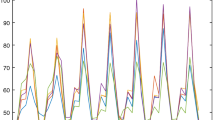Abstract
Optimal power dispatch under uncertainty of power demand is tackled via a stochastic programming model with simple recourse. The decision variables correspond to generation policies of a system comprising thermal units, pumped storage plants and energy contracts. The paper is a case study to test the kernel estimation method in the context of stochastic programming. Kernel estimates are used to approximate the unknown probability distribution of power demand. General stability results from stochastic programming yield the asymptotic stability of optimal solutions. Kernel estimates lead to favourable numerical properties of the recourse model (no numerical integration, the optimization problem is smooth convex and of moderate dimension). Test runs based on real-life data are reported. We compute the value of the stochastic solution for different problem instances and compare the stochastic programming solution with deterministic solutions involving adjusted demand portions.
Similar content being viewed by others

References
A. Azzalini, A note on the estimation of a distribution function and quantiles by a kernel method, Biometrika 68(1981)326–328.
R. Bacher, Power system models, objectives and constraints in optimal power flow calculations, in [14], pp. 159–198.
J.R. Birge, The value of the stochastic solution in stochastic linear programs with fixed recourse, Math. Progr. 24(1982)314–325.
J.R. Birge, Stochastic programming: Optimizing the uncertain, The University of Michigan, Department of Industrial and Operations Engineering, Technical Report 92–24 (1992).
A. Berlinet, Hierarchies of higher order kernels, Prob. Theory Related Fields 94(1993)489–504.
P.P.J. van den Bosch, Optimal static dispatch with linear, quadratic and nonlinear functions of the fuel costs, IEEE Trans. Power Apparatus Systems 104(1985)3402–3408.
J. Böttcher,Stochastische lineare Programme mit Kompensation, Mathematical Systems in Economics, Vol. 115 (Athenäum, Frankfurt am Main, 1989).
D.W. Bunn and S.N. Paschentis, Development of a stochastic model for the economic dispatch of electric power, Euro. J. Oper. Res. 27(1986)179–191.
G.B. Dantzig and P.W. Glynn, Parallel processors for planning under uncertainty, Ann. Oper. Res. 22(1990)1–21.
L. Devroye,A Course in Density Estimation (Birkhäuser, Boston, 1987).
J. Dupačová, Applications of stochastic programming under incomplete information, J. Comp. Appl. Math. 56(1994)113–125.
Y.M. Ermoliev and V.I. Norkin, Normalized convergence in stochastic optimization, Ann. Oper. Res. 30(1991)187–198.
Y.M. Ermoliev and R.J-B Wets (eds.),Numerical Techniques for Stochastic Optimization (Springer, Berlin, 1988).
K. Frauendorfer, H. Glavitsch and R. Bacher (eds.),Optimization in Planning and Operation of Electric Power Systems, Lecture Notes of a SVOR/ASRO-Tutorial, Thun, Switzerland, October 14–16, 1992 (Physica-Verlag, 1993).
H. Glavitsch, Use of linear and quadratic programming techniques in exploiting the nonlinear features of the optimal power flow, in [14], pp. 199–235.
N. Gröwe and W. Römisch, A stochastic programming model for optimal power dispatch: Stability and numerical treatment, in:Stochastic Optimization, ed. K. Marti, Lecture Notes in Economics and Mathematical Systems, Vol. 379 (Springer, Berlin, 1992) pp. 111–139.
J. Guddat, W. Römisch and R. Schultz, Some application of mathematical programming techniques in optimal power dispatch, Computing 49(1992)193–200.
P. Kall,Stochastic Linear Programming (Springer, Berlin, 1976).
P. Kall and D. Stoyan, Solving stochastic programming problems with recourse including error bounds, Optimization 13(1982)431–447.
K. Mai and J. Polzehl, Regression-based short term prediction of electrical load for a power system, Humboldt-Universität Berlin, Fachbereich Mathematik, Preprint Nr. 91-14 (1991).
B.A. Murtagh and M.A. Saunders, MINOS 5.1 User's Guide, System Optimization Laboratory, Stanford University (1987).
J.L. Nazareth, Design and implementation of a stochastic programming optimizer with recourse and tenders, in [13], pp. 273–294.
J.L. Nazareth and R.J-B Wets, Algorithms for stochastic programs: The case of nonstochastic tenders, Math. Progr. Study 28(1986)1–28.
B.L.S. Prakasa Rao,Nonparametric Functional Estimation (Academic Press, New York, 1983).
A. Prékopa, Dual method for the solution of a one-stage stochastic programming problem with random rhs obeying a discrete probability distribution, Zeits. Oper. Res. 34(1990)441–461.
R.T. Rockafellar, Integral functionals, normal integrands and measurable selections, in:Nonlinear Operators and the Calculus of Variations, ed. G.P. Gossez et al., Lecture Notes in Mathematics, Vol. 543 (Springer, New York, 1976) pp. 157–207.
R.T. Rockafellar and R.J-B Wets, A dual solution procedure for quadratic stochastic programs with simple recourse, in:Numerical Methods, ed. V. Pereyra and A. Reinoza, Lecture Notes in Mathematics, Vol. 1005 (Springer, Berlin, 1983) pp. 252–265.
W. Römisch and R. Schultz, Stability analysis for stochastic programs, Ann. Oper. Res. 30(1991)241–266.
W. Römisch and R. Schultz, Lipschitz stability for stochastic programs with complete recourse, SIAM J. Optim., to appear.
R.J. Serfling,Approximation Theorems of Mathematical Statistics (Wiley, New York, 1980).
G.R. Shorack and J.A. Wellner,Empirical Processes with Applications to Statistics (Wiley, New York, 1986).
H. Wacker (ed.),Applied Optimization Techniques in Energy Problems (Teubner, Stuttgart, 1985).
R.J-B Wets, Solving stochastic problems with simple recourse, Stochastics 10(1983)219–242.
R.J-B Wets, Stochastic programming, in:Handbooks in Operations Research and Management Science, Vol. 1,Optimization, ed. G.L. Nemhauser, A.H.G. Rinnooy Kan and M.J. Todd (North-Holland, Amsterdam, 1989) pp. 573–629.
B.B. Winter, Convergence rate of perturbed empirical distribution functions, J. Appl. Prob. 16(1979)163–173.
Author information
Authors and Affiliations
Additional information
This research is supported by the Schwerpunktprogramm “Anwendungsbezogene Optimierung und Steuerung” of the Deutsche Forschungsgemeinschaft.
Rights and permissions
About this article
Cite this article
Gröwe, N., Römisch, W. & Schultz, R. A simple recourse model for power dispatch under uncertain demand. Ann Oper Res 59, 135–164 (1995). https://doi.org/10.1007/BF02031746
Issue Date:
DOI: https://doi.org/10.1007/BF02031746



